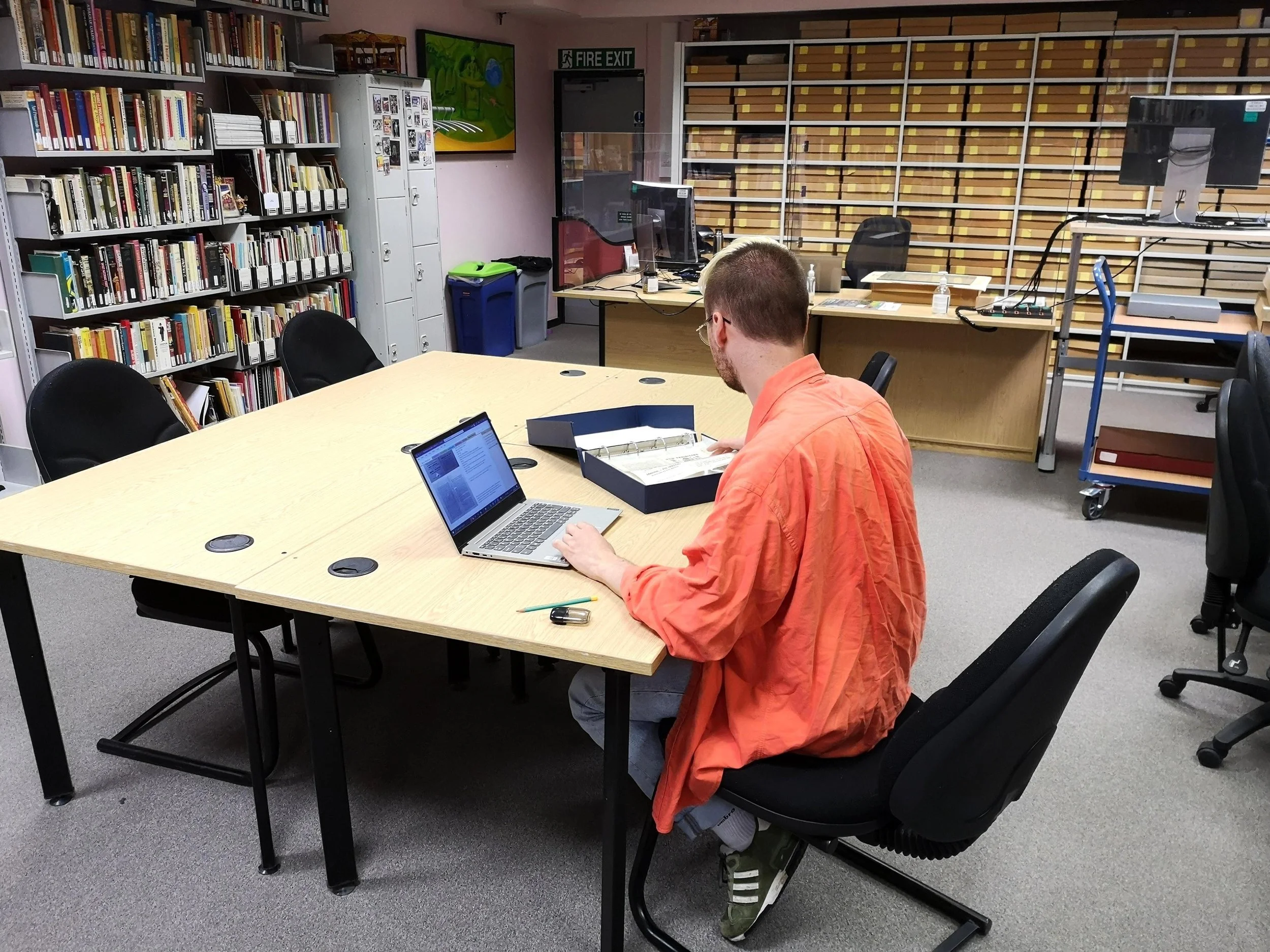People and Plants: Why all PGRs should try gardening
Adam Gordon is studying for a DFA in Creative Writing. His doctoral work explores queer histories of Glasgow, and ecology in literature. He is the outgoing coordinator for the PGR Gardening Group, based in Viewfield Lane Gardens.
Adam hanging out with some vegetables.
The PGR Gardening Group meets every Wednesday on Viewfield Lane, and I have had the pleasure of facilitating the group for the last six months or so. For various reasons, the time has come to pass that torch to someone else, and Research Culture and Researcher Development are currently recruiting someone to take over. This is a really fun and rewarding role, and I strongly encourage anyone who might be interested to check out the job description here. In this post, I wanted to take some time to write about the garden, its pleasures and possibilities.
For anyone who doesn’t know (and hasn’t been reading my weekly emails!) the garden in question is actually a series of walled gardens on Viewfield Lane, between the Stevenson Building and the Fraser Building. Everyone who comes for the first time says some variation of ‘Oh, I’ve been meaning to come for ages but I didn’t have the time.’ The beauty of the garden is that it’ll be there when you’re ready to come along, and it will always have something to show you. Granted, it doesn’t look its best at this time of year; this period is for maintenance, repairs, and preparation. But it’s also the moment when the snowdrops burst into sudden, miraculous life, followed by the crocuses, and even some early daffodils. When you see that the hard work you did in autumn has paid off, and that almost everything has survived the colder months. When birds return in ever increasing numbers, trees bud, and little shoots of renewal sprout everywhere. We notice these things in the park and on the street, but it really is different when it’s something you yourself planted months ago, and worried about on the frostiest nights.
Time spent with other living things is one of the main reasons I’ve loved this role. We’ve seen weasels, foxes, squirrels, scores of different types of bird and insect, and hundreds of plants. In addition, it’s a lovely way to meet people: as much as anything, the garden is a place to spend time with other folks and to talk. Doing something simple and practical, especially outdoors, is a really good way to clear your head after a day’s work, and draw a healthy boundary between the office and home. The beauty of sharing tasks with people is that you don’t need to talk - it’s lovely to work in companionable silence - but if you want to there are always folks who are happy to listen. Some people come faithfully for months on end, others drop in from time to time, and others come once or twice and not again. All of this is how it should be. The group facilitator is there to make sure any really necessary tasks are taken care of, so that others don’t need to take on those obligations unless they want to. I knew a little about gardening when I started, but I’ve learned a lot by reading, experimenting, and from others who came to the group.
PGRs tending a vegetable bed.
Another wonderful thing about gardening is that plants don’t care who you are, where you came from, or how you feel that day. They respond to love and attention, and they offer sustenance for your soul or your stomach, or both. This relationship is intensely liberating. It’s not something I can describe well, it’s something you need to discover for yourself, but it’s perfectly possible to be alone in the garden and not feel lonely at all. Viewfield Lane will always be a bit ramshackle, but it’s full of small pleasures, surprises and secrets. It is a place of calm, and even though you can hear the traffic, you can also hear the birds, and the wind in the leaves, and the chatter of squirrels. Gardening in a place like Viewfield is about cultivating an eye for opportunity. Deciding to let that weed grow because it’s beautiful and the butterflies like it. Trimming a branch or two to make room for something that’s seeded itself in the soil. Noticing where certain birds like to rest and making space for them. Also, noticing that someone is struggling a bit that day and checking in. It’s all part of the same process.
Zora Neale Hurston said that trees and plants always look like the people they live with, which for a gardener is quite a thought. What do my plants say about me? Perhaps a community garden, too, looks like the group that tends it. There’s no real logic to how the gardens are laid out, they’ve just adapted themselves to the available space. Similarly, there are many and varied groups of people who spend time in the gardens. We don’t always see each other, even, but you know someone’s been in and swept a path, or watered your veg bed because it needed doing. We are strangers united by a common project, taking care of the same thing, which, without being grand about it, feels like something important.
Daffodils in the garden.
Like I said, whenever you’re ready to discover it, the garden will be there for you. Just ask yourself, what are you waiting for? (If it’s guaranteed good weather, you’re going to have a long wait!) And if you think you might be the person to take over the running of the group, you can find all the info you need and make your application here. You can also get in touch with me directly if you’d like to ask anything about the role.
The PGR Gardening Group meets every Wednesday at Viewfield Lane from 4-6pm. No experience necessary! Just drop in and say hi.






